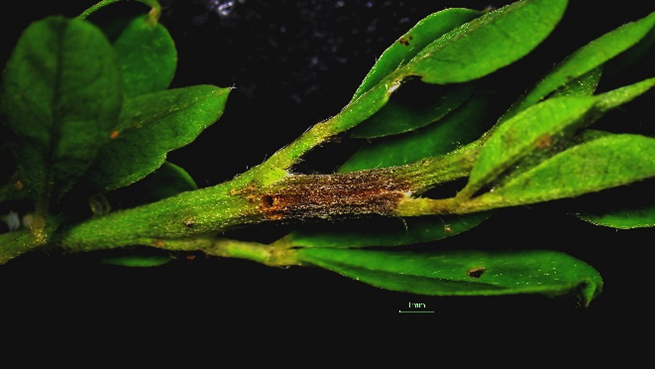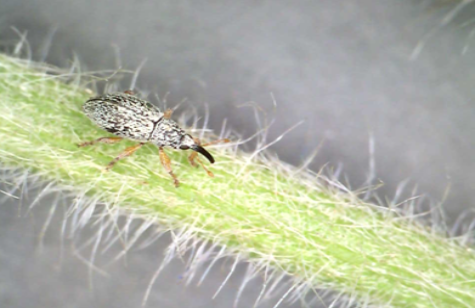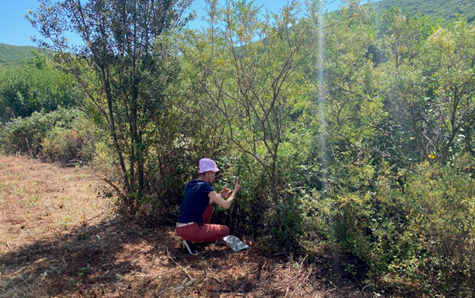EBCL Investigates Microbial Safety of Lepidapion argentatum
A Biocontrol Agent of the Invasive French Broom
By Mélanie Tannières and René Sforza, European Biological Control Laboratory (EBCL)
French broom (Genista monspessulana; Fabaceae) is a leguminous shrub that is an invasive alien weed in California and nearby US states, but also in South America, Australia and New Zealand. This weed competes with native vegetation and increases the risk of wildfires. As part of a biological control program in the U.S., the gall-forming and seedpod weevil Lepidapion argentatum is being evaluated as a biocontrol agent.

Damages caused by Larvae in seedpod. (Photo by Mélanie Tannières)

Old gall on stem. (Photo by Mélanie Tannières)
However, several steps must be completed prior to release of an invasive weed biocontrol agent into an introduced range to guarantee its safety for the new environment: verification of the taxonomic status, study of the developmental and reproductive characteristics, host specificity tests, and determination of the sanitary status of biocontrol agents.
The sanitary status of biocontrol agents must be investigated because they can carry plant and/or insect pathogens representing a risk to biodiversity and biological control success in the introduced range. Thus, sampling seedpods, galls and adults from a native population in southern France was performed to check their sanitary status to make sure they are free from pathogens. Using microbial isolation and molecular methods, eight worldwide distributed fungal genera were identified and no insect pathogens. Isolated fungi belong to fungal groups generally described as saprophytic fungi or opportunistic plant pathogens.
These results, in addition to the double ability of L. argentatum to develop in stems and pods which increases its potential value as a biocontrol agent against French broom, indicate that L. argentatum could be an efficient and safe candidate for the control of the invasive French Broom.
 Lepidapion argentatum (Photo by René Sforza)
Lepidapion argentatum (Photo by René Sforza)

Field collection (Photo by René Sforza)
Contact: Robert Shatters
The European Biological Control Laboratory (EBCL) was established in 1991 near Montpellier, France. EBCL was created by the merger of the former European Parasite Laboratory, established in Paris in 1919, and the Biological Control of Weeds Laboratory in Rome. EBCL has a satellite laboratory in Thessaloniki, Greece. As the only USDA ARS-operated laboratory outside the United States, EBCL develops biological control technologies which can be used to suppress invading weeds and insect pests of Eurasian origin. EBCL researchers do this by searching for natural enemies (insects, mites, and pathogens) in their native habitat, determining their identity, testing their host specificity and potential impact in laboratory and field experiments, and shipping promising organisms to the U.S. for further testing as biological control agents. EBCL collaborates with scientists in many countries in Europe, Asia, and Africa to explore in regions of origin of the target weeds and insects.
